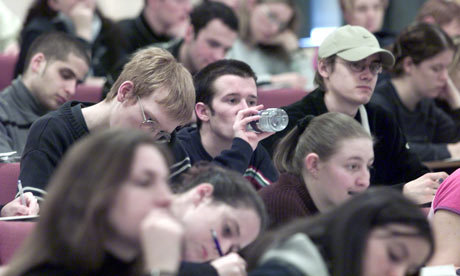Expansion of higher education is a key
element in our democracy
Whatever the arguments about 'dumbing down' and the over-production of graduates, widening participation means higher education is no longer linked to elitism, but to citizenship
-

- The Guardian, Tuesday 16 March 2010

Going to college is a quasi-compulsory precondition for full participation in our society Photograph: Don McPhee
What is higher education for? Not a question, the makers of our modern system of higher education would have liked much. They would probably have preferred a gentler, more liberal and plural, formula – such as the "purposes of higher education".
Language is always revealing. Today there seems to be a black and white choice between "what is higher education for", bristling with instrumentality, and "higher education for its own sake", all blue-skies. The truth is neither serves. Higher education can never be reduced to an academic services industry mass-producing expert skills and useful research. But nor, in an age of mass access and a knowledge society, can it be a purely "donnish dominion". Universities touch the fabric of our society at too many points.
A rather similar black and white contrast is drawn between higher education as a quasi market enterprise run on corporate lines, and higher education as a social project – widening participation, student expansion and maybe even a little bit of social engineering. Or a third contrast between the idea of the university as a "delivery organisation" for political agendas (the very phrase used to me by a civil servant a few months ago, in all innocence) and the university as an autonomous, even critical, institution right at the heart of civil society.
None of these contrasts captures the complexity of roles of higher education today. The modern university is all of these things, and none of them entirely, and more besides. The one thing we never really "get" about the mass higher education system we have created over the past half century, which is central to defining its purposes, is its essential link with democracy.
Buried deep in the psyche of British (certainly English) higher education there are still residues of noblesse oblige and its historical role of co-opting the best of the brightest into the ruling class. So widening participation is all very well at the margins. But it becomes a threat if it moves centre-stage.
The contrast with the US is stark. Going to college is part of being American; it has a direct link through to the founding values of the republic. So big books like Amy Gutmann's Democratic Education get written – and noticed. The fact that she is now president of the University of Pennsylvania, a world-class research university, (and was provost at Princeton) only emphasises how wide the Atlantic is. Her peers here mainly obsess about improving their performance in the forthcoming Research Excellence Framework.
Higher education in Britain suffers from this "missing link" in two ways. First, debates about charging fees or encouraging greater diversity of institutional missions become instantly toxic because they are seen as rooted in unjust class distinctions, (even though the social profiles of leading universities in the US and Britain – and the rest of Europe – are remarkably similar).
Second, we may fail to recognise creeping social realities. Despite everything, the expansion of higher education has been a key element in the progress of our democracy. Higher education is no longer about elites but about citizens – because going to college is a quasi-compulsory precondition for full participation in our society, the gateway into Middle England.
A lot of the ambivalence about the – now sadly abandoned – 50% participation target can be explained by a worry that regarding higher education as a life-style choice opens the door to "dumbing down" – and the over-production of media studies graduates at the expense of plumbers (or, within higher education, of Stem graduates). So it is argued that universities should concentrate on producing the human capital required by the knowledge economy, not on a rootless, potentially under-educated and discontented, graduate class – which is the inevitable result of extending a general academic education to too many people.
The flaw with this choice between expert skills and intellectual values is that creative entrepreneurs and critical citizens are not different people. Very often they are the same. Another American, Richard Florida, has written about "clever cities", places where social progress, cultural experimentation, scientific advance, technological innovation and wealth generation come together. It is from the evidence of such places, nearly always university cities, that we should derive the many purposes of 21st-century higher education – not from past ghosts and present obsessions.
• Professor Sir Peter Scott is vice-chancellor of Kingston University. This article is adapted from his speech to the summit

Nenhum comentário:
Postar um comentário